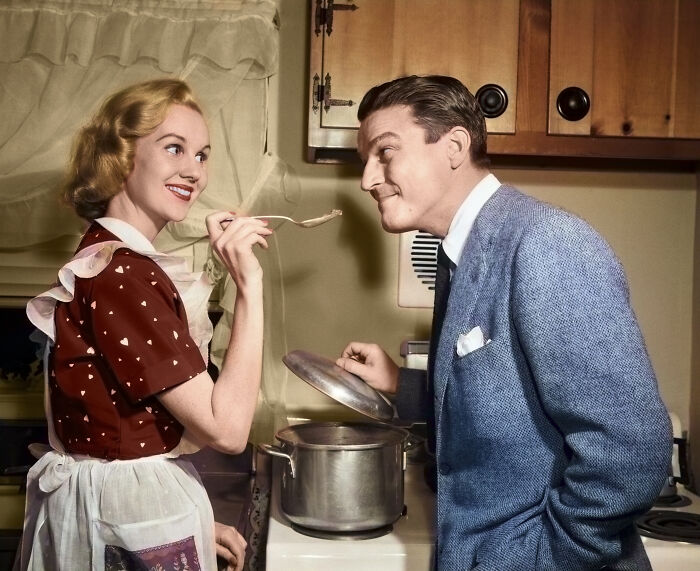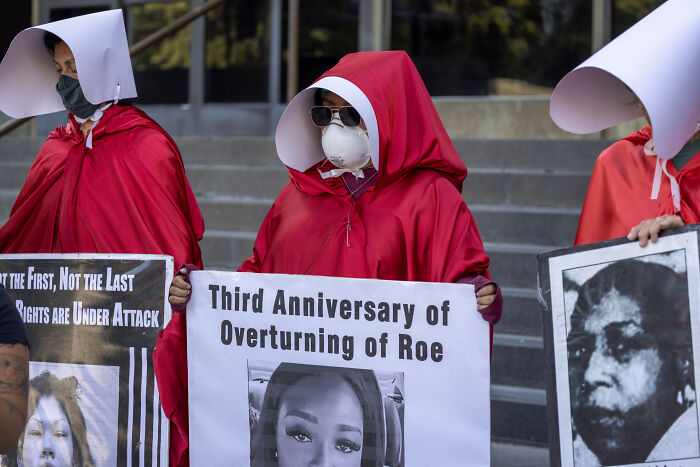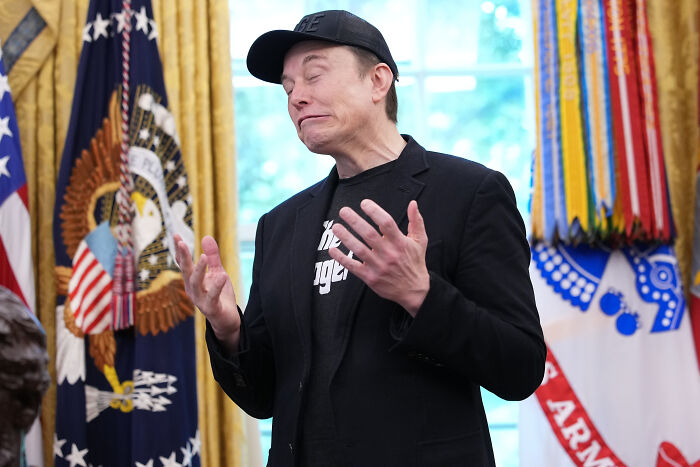According to Cambridge Dictionary, considered to be a beacon of the English language, “Skibidi. Dop, dop, dop. Yes, yes. Skibidi. Double u. Neem, neem” is now an acceptable phrase.
The internet culture is changing language as we know it, and these words you have been hearing on social media for ages have just become more legitimate.
- Cambridge Dictionary added 6,000 new words, including internet slang like 'skibidi' and 'delulu,' reflecting language's evolution by online culture.
- 'Skibidi Toilet,' a viral YouTube series, symbolizes the clash between chaotic new media and traditional establishment media in American culture.
- 'Tradwife' embodies nostalgia for 1950s gender roles, reflecting conservative political ideologies amplified on social media during the Trump era.
- 'Delulu,' meaning ‘delusional,’ became popular slang for self-belief, acting as a coping mechanism amid today's political and economic uncertainties.
- 'Broligarchy' describes a powerful clique of wealthy men influencing U.S. politics, tech, and media.
“It’s not every day you get to see words like skibidi and delulu make their way into the Cambridge Dictionary,” Cambridge Dictionary Lexical Programme Manager Colin McIntosh said about the 6,000 new words added to the dictionary this month, including many famous internet words.
Popular internet words, including ‘skibidi,’ were added to the Cambridge Dictionary this month
Image credits: Snapwire/Pexels
“We only add words where we think they’ll have staying power. Internet culture is changing the English language and the effect is fascinating to observe and capture in the Dictionary.”
Whether they will actually have staying power or not still remains to be seen. But what cannot be ignored is what these words represent—and when you take a closer look, they represent some deeper undercurrents about the American political system.
At first glance, Skibidi Toilet looks like nonsense: pixelated heads popping out of toilets, screaming songs while battling an army of mechanical men with cameras, speakers, and TVs for heads.
Image credits: Skibidi Toilet/YouTube
Created by Russian animator Alexey Gerasimov, the series exploded on YouTube in 2023. At first, it consisted of short, surreal clips featuring human heads emerging from grimy toilets, and soon turned into a narrative of a war between the Skibidi Toilets and the army of mechanical men.
For a change, even Gen Z appears to be concerned by the trend, but has made Skibidi Toilet a phrase so popular, Cambridge Dictionary had to add it.
According to the Cambridge Dictionary, Skibidi is “a word that can have different meanings such as ‘cool’ or ‘bad’, or can be used with no real meaning as a joke.”
There’s irony in a dictionary formalizing a word that admits to meaning nothing at all.
Cambridge tries to justify the entry with an example: ‘What the skibidi are you doing?’
Image credits: Skibidi Toilet/YouTube
However, as absurd as the word may be, a recent study found skibidi to be among the fastest-growing slang trends for Gen Z.
And here is the crux. Some interpret the endless war between toilets and machine-men as a metaphor for traditional media versus new media.
The toilets (nonsensical but impossible to ignore) represent the anarchic energy of memes, YouTube Shorts, and viral content online that catches your attention before you even realize what is happening.
Their enemies, the camera-heads and speaker-me, symbolize old forms of media: television and film.
In this reading, Skibidi Toilet dramatizes a cultural clash between establishment media and chaotic, decentralized internet culture.
Skibidi Toilet portrays a cultural clash between established media and decentralized internet culture
Image credits: Skibidi Toilet/YouTube
Tradwife is another addition to the Cambridge Dictionary, carrying more serious societal connotations that align with conservative ideologies being pushed amid the Trump era.
At face value, tradwife is shorthand for a perfectly coiffed woman in a pinup dress: very demure, very mindful. But behind the facade is a reflection of the conservative America the Trump administration would happily approve of.
TikTok trends showing women baking pies for their partners, tending to perfect homes, leaving their jobs to stay at home, and submitting to their husbands have been marketed as nostalgia, going back to the good old times.
Perhaps back to the great America that Trump wants to make.
Image credits: Debrocke/Getty Images
The concerning part of this trend is the idea that nostalgia deceives millions of social media users into glorifying the 1950s gender hierarchy.
The ideology of tradwives stems from politicians turning over values of neoliberal individualism and replacing them with socially conservative policies, usually informed by religion, such as the overturning of Roe v. Wade.
Image credits: David McNew/Getty Images
Just this month, U.S. Secretary of Defense Hegseth re-shared a video introducing the idea that women should not have the right to vote.
The CNN video features Doug Wilson, a senior pastor of Christ Church, who doesn’t believe women should be allowed to vote. The Pentagon later clarified that Hegseth believes women should have the right to vote.
Tradwife carries serious societal connotations that align with MAGA’s conservative ideologies
Social media amplifies this ideology as the red pill for women, so much so that it has evolved into a modern status symbol, where the tradwife lifestyle signals luxury and freedom from the chaos of modern life.
Algorithms reward this aestheticized content into something aspirational. Like everything on social media, viral content seems aspirational. While the tradwife trope seems innocent against the backdrop of catchy songs and cute trends, it sends a concerning message.
The slang term delulu, a cutesy way of saying ‘delusional,’ was also recently added to the Cambridge Dictionary. It captures this mindset: shorthand for convincing yourself that a scratch card signals instant wealth, or your self-doubt is actually a sign you’re destined for greatness.
In other words: radical, chaotic self-belief in a world that feels out of control.
The term started in K-pop fandom around 2014, where fans used it to mock each other for unrealistic fantasies about idols. Now, it’s mainstream Gen Z slang, applied to anyone entertaining fantastical ideas, but instead of being derogatory, it’s funny and lighthearted.
@biancaxb08new affirmation ✨✨♬ original sound – Bianca Bernardo 💕
Delulu is a survival mechanism, reflecting how brutal the political and economic landscape is for young people. Generations finding their way in today’s world feel helpless in a society waging wars, where social polarization is deep, the job market is collapsing, the economy is inflating, and governments feel increasingly unaccountable.
Being delulu is a way to reclaim control when reality seems stacked against you. If nothing else, you can control your own narrative, even if it’s preposterous. This fits perfectly into the growing trends of affirmations and manifestations.
The repetitive, playful sound of “delulu” makes it stick. Like “crazy crazy” or “haunted haunted,” the repetitious element of delulu is “funny and it has a sort of cutesy feel to it,” Matthew Barros, a professor of linguistics at Washington University in St. Louis, told The New York Times.
No word describes the current political system in the U.S. better than broligarchy. A portmanteau of the words ‘bro’ and ‘oligarchy,’ this term describes a small group of men who are rich and powerful, and have serious political influence.
Broligarchy perfectly describes the small group of rich, powerful men holding political influence in the U.S.
Image credits: Kevin Dietsch/Getty Images
In today’s world, these men also tend to be in tech, if the skibidi metaphor hadn’t made that obvious already. Think Jeff Bezos, Elon Musk, or Mark Zuckerberg—all of whom attended Trump’s inauguration, and have tried their hand at in politics.
A broligarchy is a world in which Musk gets to shut down federal agencies and fire workers. People in the broligarchy are now some of the biggest political donors, receiving big government contracts in return.
@thedailyshow “They want all of the privileges without the obligations.” Brooke Harrington on Trump’s tech billionaire “broligarchy” #DailyShow#Trump#Oligarchy#BrookeHarrington♬ original sound – The Daily Show
These bros don’t simply bankroll candidates: they own the platforms where political narratives are made and broken—whether it’s Musk’s X to amplifying MAGA content, Zuckerberg’s algorithm shaping what billions see (and buy) on Facebook, or Bezos owning The Washington Post while cozying up to lawmakers.













15
1